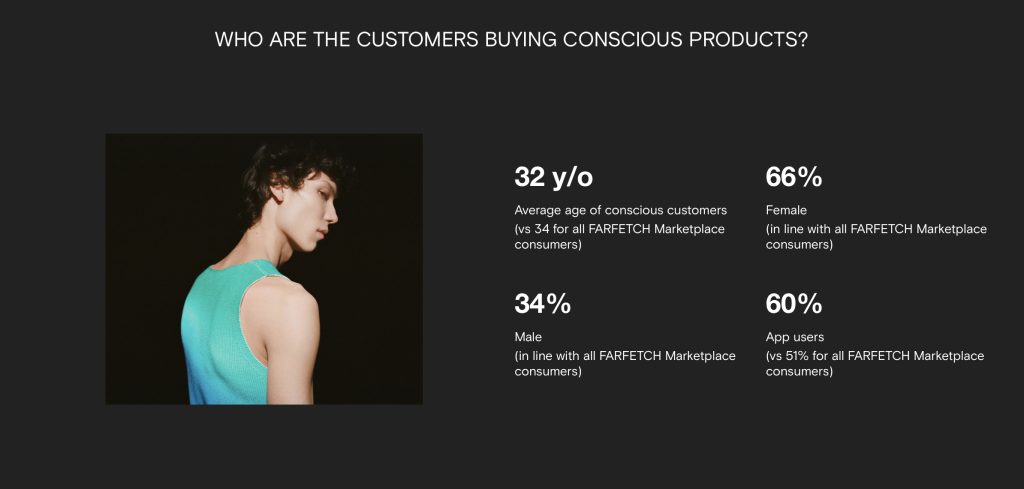This report by FARFETCH, a leading global platform for the luxury fashion industry, provides a comprehensive overview of the growing demand for sustainable fashion.
The report illuminates how consumer behaviours are shifting towards more sustainable practices. Key findings suggest an increasing consumer awareness and demand for sustainable products, with 39% of surveyed customers intentionally researching and purchasing ‘Conscious’ items. Notably, customers who engage in the platform’s resale service (FARFETCH Second Life) tend to spend 63% more, showcasing the commercial value and customer loyalty that such services cultivate.
The report also explores the parameters that define a ‘Conscious’ product, aided by collaborations with independent organizations such as Good On You and Sigillum Knowledge Solutions. This evaluation incorporates globally recognized standards for sustainable materials and business practices.
Moreover, the data identifies high-potential geographies for further expansion of Conscious products, including Brazil, Mexico, and the UAE. Interestingly, consumer searches for sustainable attributes have risen significantly, with a 78% YoY increase for Conscious-related terms. Quality, fair treatment of workers, and a brand’s overall sustainability commitment were the top priorities for consumers when shopping for luxury fashion.
In terms of product popularity, 27% of FARFETCH customers bought at least one Conscious product in 2022, an increase from 16% in the previous year. Customer perception and post-sale reflection on sustainability were also highlighted, emphasizing the need for brands to validate their sustainable claims and offer services like resale to maintain customer trust and engagement. These insights provide valuable takeaways for the luxury fashion industry, affirming the ever-growing trend towards sustainability.
Here are some key takeaways from FARFETCH’s Conscious Luxury report:
- Increasing consumer awareness and demand for sustainability in fashion. The number of customers interested in selling, donating, or repairing their items has also increased significantly.
- Conscious buying is on the rise, with 39% of FARFETCH customers intentionally purchasing fashion items labeled as ‘Conscious’, up from 19% the previous year.
- FARFETCH’s resale service, Second Life, encourages customers to spend an average of 63% more, demonstrating its commercial value and effect on customer loyalty.
- The customers buying conscious products are, on average, younger (32 vs 34 years old), predominantly female (66%), and more likely to be app users (60% vs 51%).
- High-growth and high-potential geographies for conscious products sales include Brazil, Mexico, and the UAE.
- A 78% YoY increase in searches for Conscious-related terms indicates customers’ genuine interest in sustainable products.
- The top three Conscious-related search terms in 2022 were Linen, Vegan, and Organic.
- When shopping for luxury fashion, 79% of customers prioritize long-lasting quality, enabling them to buy fewer but better items. Other priorities include fair treatment of workers and brands that prioritize sustainability.
- 27% of customers bought at least one Conscious product on the FARFETCH Marketplace in 2022, compared to 16% in 2021. The top three conscious products by GMV were from Versace (recycled), Veja (high GOY rating), and Stella McCartney (high GOY rating).
- Customers value sustainability labels, with 69% saying they use or would like to use them to inform purchase decisions, though 39% remain skeptical of some sustainability-related claims.
- 29% of consumers actively reflect on the sustainability of their purchases post-sale, emphasizing the importance of brands demonstrating their products’ positive attributes and offering services like resale to customers.
Although the conscious luxury report by FARFETCH presents compelling insights into the shifting consumer behaviors and attitudes towards sustainability in the fashion industry there are some issues with the Conscious Luxury Report :
- The report doesn’t fully address how FARFETCH ensures the transparency of ‘conscious’ product claims and the verification process. While they utilize independent organizations for classifications, the specifics of the process are not clearly laid out.
- The report suggests a significant growth in customers purchasing and searching for ‘conscious’ products, but does not provide data on the total percentage of ‘conscious’ sales compared to overall sales, which could potentially be low.
- Some geographical areas, such as the U.S and China, show lower growth rates in the sales of ‘conscious’ products compared to others, which could indicate regional discrepancies in sustainability awareness or acceptance of ‘conscious’ products.
- There is a decline in searches for ‘Vegan’ products despite a high volume of search, indicating a possible shift in consumer interest or perception.
- Despite 69% of customers stating that they do or would like to use labels to inform their purchase decisions, 39% remain skeptical of some of the sustainability-related claims. This highlights a trust issue that is not sufficiently addressed in the report.
- The report does not fully explore how the company plans to overcome skepticism towards ‘conscious’ labeling and build consumer trust.
- While the report highlights some consumer priorities related to sustainability, it fails to address how these priorities will shape FARFETCH’s strategy and actions moving forward.
- Despite focusing on ‘conscious’ products, the report does not sufficiently discuss the brands’ broader sustainability practices, which consumers indicated as important.
- The report doesn’t sufficiently address strategies for engaging the 30% of customers who do not pay attention to ‘conscious’ labels.
- The report does not explore in detail the post-sale sustainability reflections of 29% of consumers, thereby missing an opportunity to understand customer behaviours that could shape future sustainability strategies.
To conclude, the key findings of the report reveal an increasing awareness among customers of the importance of sustainability, with a significant rise in the demand for products with sustainable attributes, including pre-owned items. The report also highlights the importance of transparency in the fashion industry, as customers are not only actively seeking sustainable products, but are also keen on understanding the sustainability practices of the brands they support. Finally, the report leans on the fact that data also underlines the commercial viability of sustainable fashion, indicating a positive shift in consumer habits and preferences.
Want to read the report, do so HERE.
